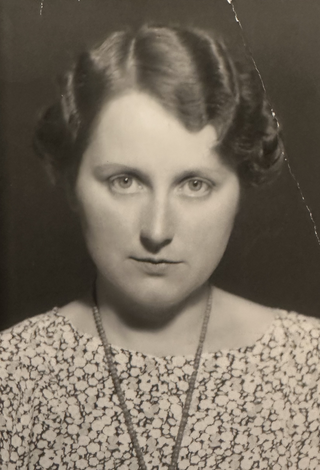Hofrat Dr. Auguste Josefine Unterberger (geb. Weber)

Personalia
Born:
Died:
Profession:
Persecution:
Dismissal 1938
Memberships
Curriculum Vitae
Auguste Josefine Weber was born in Vienna as the legitimate daughter of the general merchant Josef Weber and Barbara, née Thurner. After elementary school, she attended the Bundesrealgymnasium in Vienna's 21st district, where she graduated in 1926. She then enrolled at the Faculty of Philosophy at the University of Vienna and graduated in 1930, during which time she joined the female student association Vereinigung katholisch-deutscher Hochschülerinnen Wien. A year later, she passed her teaching exams in German and history and began working as a teacher at grammar schools.
In addition to her teaching activities, the devout Catholic, staunch Austrian and opponent of National Socialism became involved in the Vaterländische Front. Between December 1934 and February 1937, the emancipated woman was the regional women's advisor for the Vienna regional leadership, then an advisor in the general secretariat of the Vaterländische Front and head of the women's department of the VF's Neues Leben organization.
In these roles, Auguste Weber witnessed the downfall of a free and independent Austria when the German Wehrmacht invaded on March 12, 1938. Although she was able to remain in service until the end of the school year due to her excellent record, she was then dismissed from the teaching profession by the National Socialists for political reasons.
In the same year, she married the widowed lawyer Andreas Unterberger, who brought five children into the marriage. After her dismissal from the teaching profession, Auguste Unterberger enrolled in law at the University of Vienna in 1939 and passed the bar exam in 1942. However, due to her opposition to National Socialism, she was not appointed as a trainee lawyer and was therefore unable to take the court practice or assessor examinations. Their first son was born in 1940 and their second son in 1941. During this time, Auguste Unterberger actively supported her husband in his law firm and raised their children together with her husband.
Shortly before the end of the war, she fled to Styria with her two sons and one of Andreas Unterberger's daughters. There she witnessed the liberation of Austria and returned to Vienna. After her father fell dangerously ill in 1945 and she had to continue helping her husband in his law firm, she was only rehabilitated in 1947 and re-employed as a teacher. At the same time, she continued to be socially active, particularly in marriage counseling for the Archdiocese of Vienna, in Catholic mothers' groups, etc...
In 1947, together with Dita Danielski, Maria Jungwirth, Gertraud Bäumen and Anna Novak, serious efforts were made to re-establish the Catholic student association Vereinigung katholisch-deutscher Hochschülerinnnen Wien, which had been forcibly dissolved and banned in 1938. In 1949, however, the application was withdrawn by the people concerned, which meant that the first female fraternity in Austria after 1945 was not founded until 1973.
In the year that the application to re-establish the Vereinigung katholisch-deutscher Hochschülerinnen Wiens was withdrawn, their third son, who later became a leading journalist and editor in Austria, was born.
After teaching at the grammar schools in Billrothstraße, Wiedner Gürtel and Kleine Sperlgasse, she became principal at the Convent of the Dominican Sisters of Vienna in Vienna's 13th district in 1963. Her husband died in the same year.
Places
Residence:
Multimedia
Citations
Bildungsdirektion Wien
Archiv Universität Wien
Friedhöfe Wien - Verstorbenensuche
